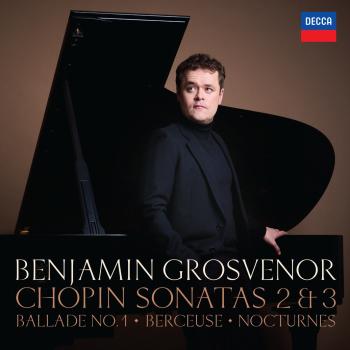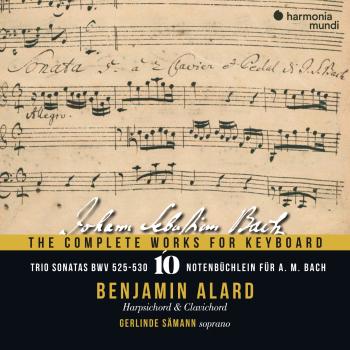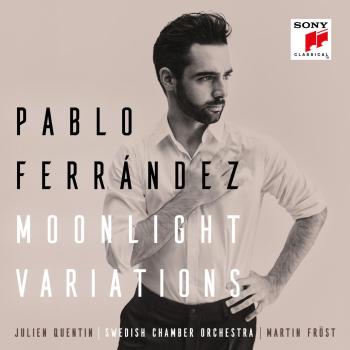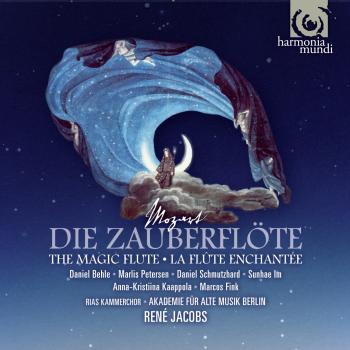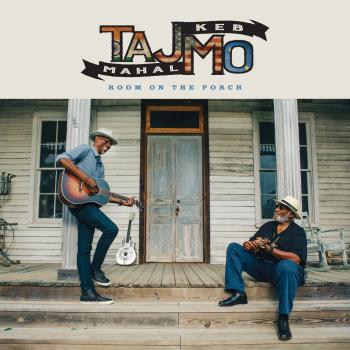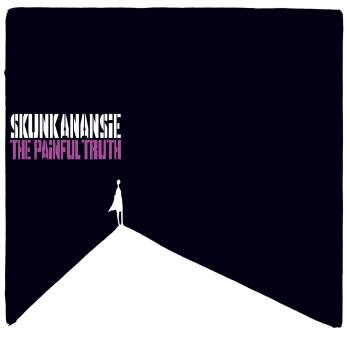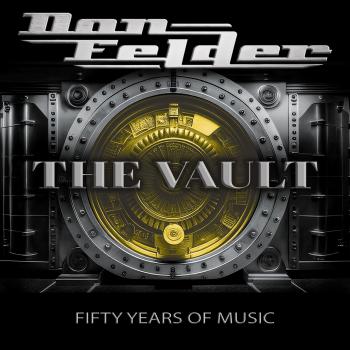
Four in One - 35 Years of Brisk Brisk Recorder Quartet Amsterdam
Album Info
Album Veröffentlichung:
2021
HRA-Veröffentlichung:
26.11.2021
Label: Globe
Genre: Classical
Subgenre: Chamber Music
Interpret: Brisk Recorder Quartet Amsterdam
Komponist: Cipriano de Rore (1516-1565), Guillaume Dufay (1397-1474), Grimace, Calliope Tsoupaki (b. 1963), Juan Felipe Waller (b. 1971), Jacob Obrecht (1457-1505), Giovanni Pierluigi da Palestrina (1525-1594), Celia Swart (b. 1994), Jacobus Clemens non Papa (1510-1555), Robert Zuidam (b. 1964), Johann Sebastian Bach (1685-1750), Guus Janssen (b. 1951), Alexander Scriabin (1872-1915), Pyotr Illyich Tchaikovsky (1840-1893), Johannes Brahms (1833-1897)
Das Album enthält Albumcover
- Cipriano de Rore (1515 - 1565):
- 1 Rore: Canon (Arr. for recorder quartet by BRISK Recorder Quartet) 02:22
- Guillaume Dufay (1397 - 1474):
- 2 Dufay: Invidia nimica (Arr. for recorder quartet by BRISK Recorder Quartet) 02:41
- Grimace:
- 3 Grimace: A l’arme, a l’arme (Arr. for recorder quartet by BRISK Recorder Quartet) 01:49
- Guillaume Dufay:
- 4 Dufay: Fuga duorum temporum (Arr. for recorder quartet by BRISK Recorder Quartet) 02:18
- Calliope Tsoupaki (b. 1963):
- 5 Tsoupaki: Aerinon (Arr. for recorder quartet by BRISK Recorder Quartet) 03:35
- Juan Felipe Waller (b. 1971):
- 6 Waller: Salupita (Arr. for recorder quartet by BRISK Recorder Quartet) 02:31
- 7 Waller: Dualfin (Arr. for recorder quartet by BRISK Recorder Quartet) 01:27
- Jacob Obrecht (1457 - 1505):
- 8 Obrecht: Fuga (Arr. for recorder quartet by BRISK Recorder Quartet) 02:26
- Giovanni Pierluigi da Palestrina (1525 - 1594):
- 9 Palestrina: Super flumina Babylonis (Arr. for recorder quartet by BRISK Recorder Quartet) 03:25
- Jacob Obrecht:
- 10 Obrecht: La Tortorella (Arr. for recorder quartet by BRISK Recorder Quartet) 01:54
- Celia Swart (b. 1994):
- 11 Swart: Generations around me (Arr. for recorder quartet by BRISK Recorder Quartet) 06:00
- Jacobus Clemens non Papa (1510 - 1555):
- 12 Papa: Angelus Domini (Arr. for recorder quartet by BRISK Recorder Quartet) 04:10
- Robert Zuidam (b. 1964):
- 13 Zuidam: Méditations sur la liberté et l’égalité III (Arr. for recorder quartet by BRISK Recorder Quartet) 03:48
- Johann Sebastian Bach (1685 - 1750):
- 14 Bach: Chorale ‘Das alte Jahr vergangen ist’, BWV 288 (Arr. for recorder quartet by BRISK Recorder Quartet) 01:07
- 15 Bach: Chorale Prelude ‘Das alte Jahr vergangen ist’, BWV 614 (Arr. for recorder quartet by BRISK Recorder Quartet) 02:01
- 16 Bach: Fuga a 4 voci, alla duodecima from Die Kunst der Fuge, BWV 1080 (Arr. for recorder quartet by BRISK Recorder Quartet) 03:00
- Guus Janssen (b. 1951):
- 17 Janssen: De Meesterfout (Arr. for recorder quartet by BRISK Recorder Quartet) 04:23
- Alexander Scriabin (1872 - 1915):
- 18 Scriabin: Canon in D minor (Arr. for recorder quartet by BRISK Recorder Quartet) 02:53
- Pyotr Illyich Tchaikovsky (1840 - 1893):
- 19 Numan, Tchaikovsky: Nocturne, Opus 19, No. 4 (Arr. for recorder quartet by BRISK Recorder Quartet) 03:32
- Johannes Brahms (1833 - 1897):
- 20 Brahms: Einförmig ist der Liebe Gram (Arr. for recorder quartet by BRISK Recorder Quartet) 02:42
Info zu Four in One - 35 Years of Brisk
Vier Musiker, die ihre musikalischen Welten gleichberechtigt teilen: das ist eine intime und anspruchsvolle Kunst, die ein großes Engagement und tiefes gegenseitiges Vertrauen erfordert. Four in One steht für vier Individuen, die eine enge kreative Einheit bilden und dabei ihre eigene Identität bewahren. Deshalb ist Four in One das perfekte Motto für das 35-jährige Bestehen des BRISK Blockflötenquartetts Amsterdam.
Aber dieses Motto bezieht sich nicht nur auf das Jubiläum von BRISK, sondern auch auf den Kanon, die bekannteste musikalische Form des Vier-in-einem. Durch die Aneinanderreihung einer Melodie entsteht ein mehrstimmiges Ganzes. Kanons von Dufay und Obrecht bis Brahms, Skryabin und Zuidam bilden den roten Faden dieser CD.
Darüber hinaus werden weitere imitatorische Formen vorgestellt, die in der Musikgeschichte häufig und gerne verwendet wurden. So haben auch das fein gewobene Stimmengeflecht der flämisch-burgundischen Polyphonie und Bachs Fugen ihren Ursprung in der kanonischen Literatur.
Darüber hinaus zeigt Four in One das reiche Repertoire von BRISK mit Alter Musik, neuen Werken, die für das Quartett geschrieben wurden, und Bearbeitungen von romantischer Musik. Die Blockflöte hat ein relativ kleines Repertoire, aber diese Einschränkung stellt eine Herausforderung dar. BRISK hat alles in seiner Macht Stehende getan, um das Repertoire zu erweitern, indem es zahlreiche Bearbeitungen in der Tradition des Instruments vorgenommen hat.
Die Orgelmusik war eine ständige Quelle der Inspiration. Immer wieder hat man BRISK gesagt, dass sie manchmal wie eine kleine Orgel klingen. "Es ist, als ob eine Orgel von einem Spieler gespielt wird, der in allen Fingern wach ist", schrieb einmal ein Rezensent über das Quartett. Jede Stimme bekommt ihre eigene Farbe, und zusammen sind sie viel mehr als eine Person, die ein vierstimmiges Stück spielt. Gerade der persönliche Beitrag und die Vielfalt mehrerer Spieler machen es zu einem lebendigen Ganzen.
Das Arrangieren von Vokalmusik mit Diminutionen und Verzierungen nach historischen Vorbildern gehört ebenfalls zu den Lieblingsbeschäftigungen von BRISK. Silvestro Ganassi schrieb 1535 in Opera intitulata Fontegara, dass die Blockflöte in der Lage ist, die menschliche Stimme durch Artikulation und den Atemfluss des Spielers zu imitieren. Für diesen Musiker und Musiktheoretiker war dies ein Ideal, das es so weit wie möglich zu verwirklichen galt. Dieser Ansatz ist wie geschaffen für BRISK.
BRISK Recorder Quartet Amsterdam
Laurens de Man, Orgel
BRISK
the ensemble’s name, is intended to convey an idea of liveliness and wakefulness. A critic once described the ensemble as providing “a coup de grâce for the recorder’s respectable image”. BRISK’s concerts exhibit variation of style and mood, virtuosity and light-heartedness in equal measure. The quartet always appear on stage with an enormous assembly of recorders. Since their founding in 1986, BRISK has given many concerts in important concert halls and festivals throughout Europe, in Bolivia, Canada and the USA. BRISK has recorded for radio and television both in the Netherlands and abroad, as well as recording over ten CDs that have been well received by both press and public.
Its daring programming of early music in combination with contemporary music is designed to expand the borders of the ensemble’s repertoire. Many composers have dedicated works to the quartet. BRISK works regularly with fellow musicians as well as with artists from other related disciplines such as actors, directors, librettists and film-makers.
BRISK made its name through lively performances of early music, the search for little-known repertoire, and for the many arrangements that the ensemble has made, which suit the style and tradition of the instrument. BRISK has collaborated with Amaryllis Dieltiens, Michael Chance, Marcel Beekman, Johannette Zomer, Maarten Koningsberger, the Egidius Kwartet, the Gesualdo Consort, Bernard Winsemius, Leo van Doeselaar, Rainer Zipperling, Mike Fentross and Camerata Trajectina amongst others.
The long list of composers that have written music for the quartet includes Martijn Padding, Kate Moore, Calliope Tsoupaki, Bart Visman, Klaas de Vries, Roderik de Man and many others.
New works are presented as a comment on or as a contrast to older works in BRISK’s programmes. There is also a large quantity of new music in BRISK’s programmes for younger audiences. BRISK regularly gives concerts in collaboration with specialists in contemporary music such as pianist Tomoko Mukaiyama, composer and improviser Guus Janssen, vocalist Greetje Bijma and percussionist Ramon Lormans.
BRISK has created a number of highly successful productions for children with directors David Prins, Jetse Batelaan, Marc Krone, Gienke Deuten and actors Porgy Franssen, Bart Kiene and Hans Thissen.
The quartet possesses a great variety of instruments; its extensive contacts with recorder makers throughout the world ensure that its collection is in a state of continual development. This variety of instruments enables the ensemble to perform works from the Renaissance and the Baroque as well as the 20th and 21st centuries in their correct tuning and with the correct timbre.
Laurens de Man
studied piano achieving excellent results and organ receiving cum laude at the Conservatory of Amsterdam with Jacques van Oortmerssen, David Kuyken and Johan Hofmann. From 2017 to 2019 he studied at the Berlin Universität der Künste with Leo van Doeselaar. He completed these studies with the highest marks. Laurens won prizes at the Princess Christina Competition (first prize), at the Internationaler Klavierwettbewerb “J.S. Bach” in Würzburg and at the International Martini Organ Competition in Groningen. In 2018 he was awarded the Sweelinck-Muller Prize. In 2019 he won first prize at the Silbermann-Orgelwettbewerb in Freiberg; this gave him the title “Young ECHO Organist of the Year 2020”. As pianist of the Chimaera Trio, he plays and arranges chamber music covering four centuries of music history; the trio presented its CD debut in the series “AvroTros Klassiek Presents!”. Since 2012, Laurens has been principal organist of the Janskerk in Utrecht.
Dieses Album enthält kein Booklet

